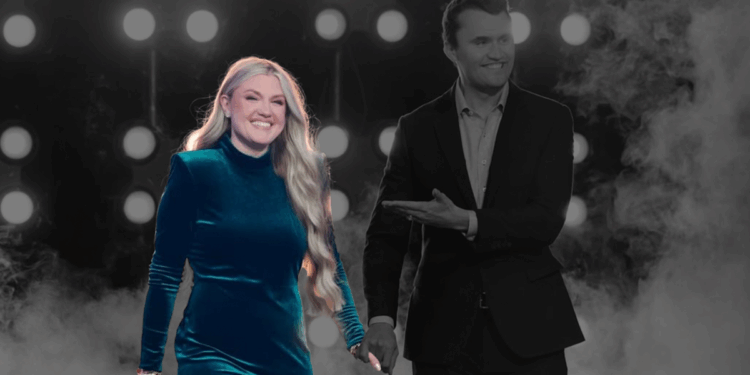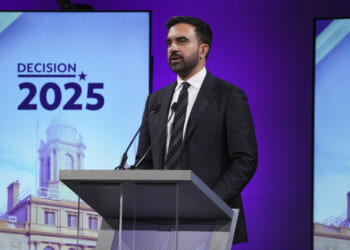When Erika Kirk lost her husband, Charlie Kirk, in a shocking public assassination, she entered a space most of us can’t even begin to imagine being in. Not just the sudden death of her spouse, but the fact that live footage of the horrific event was circulated on social media for the world to see, and immediately afterward, the entire organization that Charlie had spent over a decade building now rested on her shoulders.
As such, the demand for leadership and delivering speeches to those who looked up to her husband for guidance has been a constant in Erika’s life. And to some, her public appearances have made it seem as though she is not as sad as she should be. The sincerity of her grief has been called into question.
On both the Left and even the Right, trolls and critics emerged almost immediately — not just questioning what she does after his death, but how she has been handling it. Some have even mocked her, while others have insisted that her grief couldn’t possibly be real because she doesn’t look like their idea of what grief should look like.
It is both deeply unfair to judge her according to personal standards, as grief is an extremely individualized journey, and also reflective of how modern politics loves to weaponize and exploit vulnerability.
Let’s pause to lay out the facts: Charlie Kirk was shot while speaking at a campus event in Utah. Erika — suddenly widowed, with two very young children — is not just grieving privately; she is thrust into the public eye. She was almost immediately named by the board of Turning Point USA (the organization he founded) as CEO and chair of the board. On top of that comes the intimate, personal loss of husband and father, the responsibility of caring for children, the legacy of an organization, and the post-traumatic consequences of extraordinary violence. This is not your typical mourning journey.
In Erika’s case, the stakes are compounded: her spouse was murdered in front of an audience; she simultaneously must tend to two little kids, launch a new era of the organization, manage media, and exist among deep political fault lines of support and backlash. Someone telling her how to behave ignores this important context. They pretend her life is normal and her grief is simple.
Unfortunately, it didn’t take long for social-media critics to start flinging statements like: “Why is she speaking so soon? She seems too composed. Doesn’t she know how to cry? Doesn’t she know how to look like she’s grieving?”
One post read: “This might be unpopular, but I find it very weird how a widow has stepped into the CEO role. Delivered two speeches … and is already going on podcast just 2 weeks after her husband was assassinated. Instead of being home with her two young children who just lost their dad.”
Then, there were videos posted, openly mocking Erika’s memorial speech, in which she forgave the individual who took Charlie’s life. One TikTok nurse-commentator reenacted Erika’s words, exaggerating her facial expressions and pretending to cry, implying that it was nothing more than a show.
What’s deeply troubling behind the flood of takes by non-professionals with far too much time on their hands, and not enough compassion in their souls, is the assumption behind the critiques: that there is only one way to grieve. That the widow must collapse in public, weep nonstop, withdraw from all commitments, and mourn “appropriately” by some external standard. And when she does not, the response is: “She’s fake. She’s not hurting. She’s putting on an act.”
Yet anyone who has experienced the loss of a loved one understands that grief doesn’t come with a uniform protocol. Every person’s internal timeline, emotional rhythm, and public face are different. You only see fragments of anyone’s process — especially in our era of reels, short posts, and soundbites.
And that’s why many of the comments feel so heartless. It’s one thing to ask questions, to wonder how someone manages public duties so soon after tragedy. But it’s quite another to mock or delegitimize someone simply because you’re only seeing them when they are composed, or because they don’t behave like your idea of mourning.
Let’s also recognize that the Left-Right fault lines are deepening this. On the Left, some see Erika as a symbol of the conservative movement — and treat her grief as a performance, not a personal process. On the Right, some see her as their public face now and expect her grief to resemble an anthem that represents their feelings instead of her own. Neither side seems to want to give her the space to just be a widow in a tragic and unprecedented circumstance.
Apparently, the message that the critics want Erika to hear is that she needs to prove that she is feeling the loss. Keeping tears, late-night breakdowns, moments of despair behind closed doors is unacceptable. Her feelings must be on full display in order to be considered legitimate.
There is no thought that a stage clip, a speech, or a social-media post is a carefully selected, planned glimpse of her life, where she can coach herself into composure for a few minutes. Then take the time to feel the true weight of her heartache when she’s in the company of friends, family, and colleagues who are grieving along with her.
In this unimaginable situation, one must recognize the burden she accepted. After Charlie’s death, the board of Turning Point USA announced she would succeed him, describing his prior preparation in case of the unthinkable. She is living that burden. Her grief, then, is not only private sorrow but also a public mission. She might speak, step forward, act — not in spite of her grief, but because her grief and sense of purpose are intertwined.
The bigger lesson? When we point fingers at someone’s heartbreak — especially when that person is simultaneously thrust into unexpected public leadership — we reveal our own limited view of the overall human experience. Perhaps the real question shouldn’t be why she’s not crying more, but why the public is imposing personal expectations of “normal” behavior on her. Why do we rush to critique, rather than pause, listen, give space, and simply say: “I’m so sorry you’re hurting.”
So, to those on both sides who mocked or questioned Erika Kirk: stop. The truth is, you don’t know what you’d do in her shoes — none of us do. Maybe recognize that behind every public speech is a private devastation. Perhaps set a new expectation for yourself, to treat someone else’s heartache with humility, not as another thing to judge.
Everyone deals with loss differently. The private and public processes can look very, very different. And when the stakes include children, legacy, organizational leadership, and public activism, the path is going to be anything but “normal.”
Perhaps this could teach us about true empathy — not performative empathy; about resisting the urge to say “you’re doing it wrong.” Because you truly don’t know.
Let the widow mourn. Let her lead. Let her cry when she needs it. And let the rest of us keep our critiques to ourselves, so we can focus on the things that really need our attention — saving our country through conversation and common ground, as Charlie would want.
















